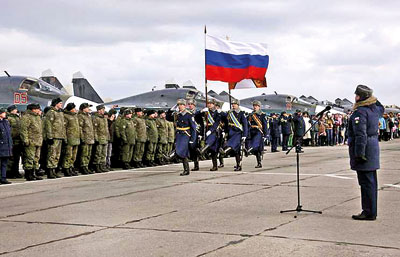Sunday Times 2
The Russian diplomatic service celebrates its 470th anniversary
On the 10th of February each year, the Russian diplomatic service celebrates its professional holiday — Russian Diplomats’ Day — which was established by a Presidential Decree in 2002.

Russian troops in Syria: A game changer
The date is closely associated with the history of Russia’s first foreign affairs agency — the Ambassadorial Department established on February10, 1549. From 1718 to 1720, it was gradually transformed into the Collegium of Foreign Affairs by Emperor Peter the Great. In 1802, the modern form of foreign policy management — the Ministry of Foreign Affairs — was created by the manifesto of Emperor Alexander I. After the October Revolution, under the decree of the new government, the People’s Commissariat of Foreign Affairs was organised, but in 1946 the Ministry returned.
Today, the Ministry of Foreign Affairs consists of several thousand employees of the Central Office in Moscow, more than 200 foreign offices around the world (Embassies, Consulates, etc.) and about 40 regional offices throughout the Russian Federation.
Russian Diplomats’ Day gives a good opportunity to highlight the main international events and summarise the results of our diplomatic efforts during the previous year.
The international situation in 2018 remained complicated. The conflict potential increased last year, primarily because of the unwillingness of some Western countries led by the United States to accept the realities of objectively developing a multipolar world, and also because of their continued desire to force their will on others by means of pressure and economic and propaganda instruments.
Russia continued to pursue a multidirectional foreign policy focused on protecting its national interests. Work was done to strengthen the positive trends on the international stage to find collective solutions based on international law to the problems all countries were facing, and ultimately to promote a fairer and more democratic polycentric world order in keeping with objective modern realities.
Russia closely cooperated with its allies and partners at the Collective Security Treaty Organisation, the Eurasian Economic Union (EAEU), the Commonwealth of Independent States, BRICS and the Shanghai Cooperation Organisation, and kept working constructively in the key global governance bodies, primarily the United Nations and G20.
As part of Russia’s presidency of the EAEU, work was done to strengthen the organisation’s international standing and work towards aligning the EAEU with China’s Belt-and-Road initiative and promoting a strategic partnership with the Association of Southeast Asian Nations (ASEAN). This was in the context of President Putin’s initiative for creating a Greater Eurasian Partnership based on the logic of harmonising our integration processes with all countries and associations both in Asia and in Europe.
International terrorism has been dealt a severe blow in Syria. This allowed us to preserve the Syrian state and helped that country to launch an economic recovery. It also enabled the refugees to return. In keeping with the decisions taken at the Syrian National Dialogue Congress in Sochi, the guarantor countries of the Astana Process — Russia, Turkey and Iran — worked hard to help form the Constitutional Committee by convincing the Syrian Government and the opposition to approve the list of its potential members. This has created conditions for a political process in full compliance with UN Security Council Resolution 2254 in the interests of a lasting settlement of the Syrian crisis.
Russia supported the positive trends on the Korean Peninsula based on the logic of the Russia-China roadmap for a settlement.
Another major result of the past year was the signing of the Convention on the Legal Status of the Caspian Sea at the fifth Caspian Summit. This convention seals the coastal states’ exclusive rights to this unique body of water and its mineral and other resources.
Russia made significant efforts to ensure international information security and to fight cybercrime. In December, the UN General Assembly approved two resolutions on this matter on Russia’s initiative.
Russia paid special attention to the further development of contacts with millions of Russians living all over the world. The 6th World Congress of Russian Compatriots Living Abroad was held from October 31 to November 1 in Moscow.
Russia expanded humanitarian, research and educational ties, and supported various initiatives aimed at introducing to the world community Russia’s best achievements in national culture and art. Russia assisted foreign countries in the training of their national personnel.
The FIFA World Cup was a highlight last year – a real triumph of public diplomacy. Millions of foreign guests visited Russia.
A lot of progress has been achieved in developing Russia-Sri Lanka relations. The latest example of our ever-growing partnership was the establishment of direct flights between Moscow and Colombo in October 2018. We are confident that it will greatly contribute to the people-to-people contacts as well as to the exchange of business delegations.
This year, Russia intends to step up efforts in all the key areas. Among the top priorities is the promotion of creating a truly universal anti-terrorist coalition under the auspices of the UN, mobilising the international community to more effectively combat drug trafficking and other types of organised crime. Russia will help consolidate positive trends in Syria and on the Korean Peninsula and resolve other crises and conflicts, especially in the Middle East, North Africa and Ukraine, where there is no alternative to the full and consistent implementation of the Minsk Agreements. As before, Russia is interested in restoring normal relations with the US and the EU on the principles of equality and mutual consideration of interests. But, Russia will continue to respond appropriately to the increased NATO military activity and its military infrastructure being moved closer to the Russian borders.

